Black Music Matters: Why We Celebrate African-American Music Appreciation Month
(Newsweek) Even Elvis Presley, who has long been revered as the King of Rock ‘n’ Roll, was heavily influenced by the sound and swagger of Chuck Berry, a guitarist, singer and songwriter who forged a style of rhythm and blues back in the 1950s that ultimately led to the creation of rock music. Elvis’ own discography features a few songs originally composed and performed by Berry, including classics like “Maybellene” and “Memphis, Tennessee.”
Just about every genre of music has, in some way, been touched and influenced by African-Americans. That’s why in 1979, President Jimmy Carter proclaimed the month of June as Black Music Month.
The month-long observance, which was first inducted on June 7, 1979, was created to recognize and celebrate the historical influence African-Americans have had on the music industry and is intended to pay homage to the many artists, writers, songs and albums that have shaped American pop culture and the inspiring musical moments that have brought citizens—white, black and every other skin color—together. (more)
Related video: History of African American Music in 10 Minutes
Book Review: A Powerful, Disturbing History of Residential Segregation in America
THE COLOR OF LAW
A Forgotten History of How Our Government Segregated America
By Richard Rothstein
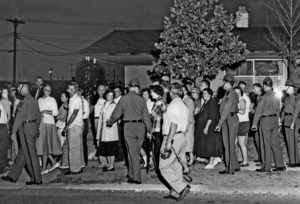
Police and demonstrators in front of the home of a black family in Levittown, Pa., Aug. 20, 1957. Credit Sam Myers/Associated Press
(New York Times) In the summer of 1950, with Americans reeling from the news of North Korea’s invasion of South Korea and Senator Joseph McCarthy’s ever expanding “Red hunt” in Washington, Time magazine ran a disarmingly cheerful cover story about the nation’s housing boom, titled: “For Sale: A New Way of Life.” Featuring the builder William Levitt, who had recently transformed some Long Island potato fields into a sprawling complex of starter homes — two bedrooms, one bath and an extension attic for $7,990 — it spoke reverentially of the development’s parks and playgrounds and many rules. “Fences are not allowed,” Time noted. “The plot of grass around each house must be cut at least once a week,” and laundry couldn’t be hung outside “on weekends and holidays.”
One rule, however, was conveniently absent from the piece. Homeowners in Levittown were forbidden to rent or sell to persons “other than members of the Caucasian race.” Asked about this so-called “racial covenant,” Levitt blamed society at large. “As a Jew, I have no room in my mind or heart for racial prejudice,” he said. “But I have come to know that if we sell one house to a Negro family, then 90 or 95 percent of our white customers will not buy into the community. This is their attitude, not ours. As a company, our position is simply this: We can solve a housing problem, or we can try to solve a racial problem, but we cannot combine the two.”
As Richard Rothstein contends in “The Color of Law,” a powerful and disturbing history of residential segregation in America, the government at all levels and in all branches abetted this injustice. (more)
American slavery: Separating fact from myth
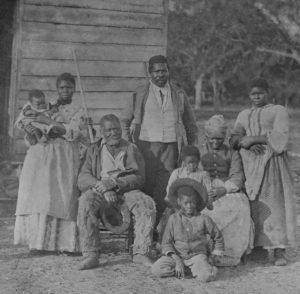 (The Conversation) People think they know everything about slavery in the United States, but they don’t. They think the majority of African slaves came to the American colonies, but they didn’t. They talk about 400 years of slavery, but it wasn’t. They claim all Southerners owned slaves, but they didn’t. Some argue it was all a long time ago, but it wasn’t.
(The Conversation) People think they know everything about slavery in the United States, but they don’t. They think the majority of African slaves came to the American colonies, but they didn’t. They talk about 400 years of slavery, but it wasn’t. They claim all Southerners owned slaves, but they didn’t. Some argue it was all a long time ago, but it wasn’t.
Slavery has been in the news a lot lately. From the discovery of the auction of 272 enslaved people that enabled Georgetown University to remain in operation to the McGraw-Hill textbook controversy over calling slaves “workers from Africa” and the slavery memorial being built at the University of Virginia, Americans are having conversations about this difficult period in American history. Some of these dialogues have been wrought with controversy and conflict, like the University of Tennessee student who challenged her professor’s understanding of enslaved families.
As a scholar of slavery at the University of Texas at Austin, I welcome the public debates and connections the American people are making with history. However, there are still many misconceptions about slavery, as evidenced by the conflict at the University of Tennessee. (more)
The Plot to Disrupt the NCAA with a Pay-for-Play HBCU Basketball League
The Plot to Disrupt the NCAA with a Pay-for-Play HBCU Basketball League
 (Vice Sports) What if I told you there was a way to pay men’s college basketball players a fairer portion of the hundreds of millions of dollars they generate, boost the flagging fortunes of the nation’s historically black colleges and universities (HBCUs), and stick it to the sanctimonious, self-serving quasi-monopolists at the NCAA?
(Vice Sports) What if I told you there was a way to pay men’s college basketball players a fairer portion of the hundreds of millions of dollars they generate, boost the flagging fortunes of the nation’s historically black colleges and universities (HBCUs), and stick it to the sanctimonious, self-serving quasi-monopolists at the NCAA?
If all of that sounds too good to be true, then you haven’t yet heard from Andy Schwarz. A San Francisco–based antitrust economist, longtime critic of college sports amateurism, and—full disclosure—occasional contributor to VICE Sports, Schwarz has a plan to make it happen. It’s a business plan, in fact, and while it’s still in its early stages, it works, in a nutshell, like this:
Step 1: Form an HBCU-exclusive basketball league. (more)
TIPHC Bookshelf
 Published scholarship on black history in Texas is growing and we’d like to share with you some suggested readings, both current and past, from some of the preeminent history scholars in Texas and beyond. We invite you to take a look at our bookshelf page — including a featured selection — and check back as the list grows. A different selection will be featured each week. We welcome suggestions and reviews. This week, we offer, “Desegregating Texas Schools, Eisenhower, Shivers, and the Crisis at Mansfield High,” (1996) by Robyn Duff Ladino.
Published scholarship on black history in Texas is growing and we’d like to share with you some suggested readings, both current and past, from some of the preeminent history scholars in Texas and beyond. We invite you to take a look at our bookshelf page — including a featured selection — and check back as the list grows. A different selection will be featured each week. We welcome suggestions and reviews. This week, we offer, “Desegregating Texas Schools, Eisenhower, Shivers, and the Crisis at Mansfield High,” (1996) by Robyn Duff Ladino.
In the famous Brown v. the Board of Education decisions of 1954 and 1955, the United States Supreme Court ruled that “separate but equal” schools for black and white students were unconstitutional. Yet history records that it took more than a decade of legal battles, civil rights protests, and, tragically, violent confrontations before black students gained full access to previously white schools.
Mansfield, Texas, a small community southeast of Fort Worth, was the scene of an early school integration attempt. In this book, Robyn Duff Ladino draws on interviews with surviving participants, media reports, and archival research to provide the first full account of the Mansfield school integration crisis of 1956.
Ladino explores how power politics at the local, state, and federal levels ultimately prevented the integration of Mansfield High School in 1956. Her research sheds new light on the actions of Governor Allan Shivers—who, in the eyes of the segregationists, actually validated their cause by his political actions—and it underscores President Dwight Eisenhower’s public passivity toward civil rights during his first term of office.
Despite the short-term failure, however, the Mansfield school integration crisis helped pave the way for the successful integration of Central High School in Little Rock, Arkansas, in 1957. Thus, it deserves a permanent place in the history of the civil rights movement, which this book amply provides.
This Week in Texas Black History, June 18-24
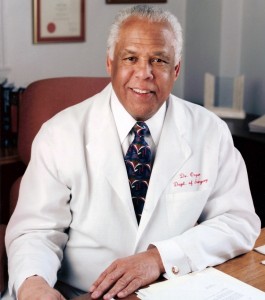 18 – On this day in 2005, renowned surgeon and educator Claude H. Organ, Jr. died in Berkeley, Ca. of heart-related problems at age 78. A Marshall native, Organ was accepted to the University of Texas medical school, but when the school discovered he was black, it offered to pay the difference in tuition for him to attend another school. He graduated from Xavier University a black college in New Orleans and later received a degree from Creighton University School of Medicine in Omaha. Organ developed two successful surgical residency programs, first at Creighton and later at the University of California/Davis-University of California, San Francisco East Bay Surgery Department. During his tenure at San Francisco he served as the first African American editor of the Archives of Surgery, the largest surgical journal in the English-speaking world.
18 – On this day in 2005, renowned surgeon and educator Claude H. Organ, Jr. died in Berkeley, Ca. of heart-related problems at age 78. A Marshall native, Organ was accepted to the University of Texas medical school, but when the school discovered he was black, it offered to pay the difference in tuition for him to attend another school. He graduated from Xavier University a black college in New Orleans and later received a degree from Creighton University School of Medicine in Omaha. Organ developed two successful surgical residency programs, first at Creighton and later at the University of California/Davis-University of California, San Francisco East Bay Surgery Department. During his tenure at San Francisco he served as the first African American editor of the Archives of Surgery, the largest surgical journal in the English-speaking world.
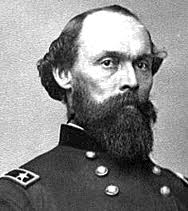 19 – On this day in 1865, Union General Gordon Granger arrived in Galveston and delivered the news about the Emancipation Proclamation, which had originally been issued by President Abraham Lincoln in 1863. Granger, supposedly from a balcony at Ashton Villa, one of the state’s first brick structures, read General Order No. 3, which officially freed 250,000 slaves in Texas. The order read: “The people are informed that in accordance with a Proclamation from the Executive of the United States, all slaves are free. This involves an absolute equality of personal rights and rights of property, between former masters and slaves, and the connection heretofore existing between them, become that between employer and hired labor. The freed are advised to remain at their present homes, and work for wages. They are informed that they will not be allowed to collect at military posts; and that they will not be supported in idleness either there or elsewhere.” In 1979 Governor William P. Clements signed an act making the day a state holiday. The first state-sponsored Juneteenth celebration took place the next year.
19 – On this day in 1865, Union General Gordon Granger arrived in Galveston and delivered the news about the Emancipation Proclamation, which had originally been issued by President Abraham Lincoln in 1863. Granger, supposedly from a balcony at Ashton Villa, one of the state’s first brick structures, read General Order No. 3, which officially freed 250,000 slaves in Texas. The order read: “The people are informed that in accordance with a Proclamation from the Executive of the United States, all slaves are free. This involves an absolute equality of personal rights and rights of property, between former masters and slaves, and the connection heretofore existing between them, become that between employer and hired labor. The freed are advised to remain at their present homes, and work for wages. They are informed that they will not be allowed to collect at military posts; and that they will not be supported in idleness either there or elsewhere.” In 1979 Governor William P. Clements signed an act making the day a state holiday. The first state-sponsored Juneteenth celebration took place the next year.
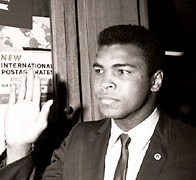 20 – On this day in 1967, a jury in federal court in Houston found heavyweight champion Muhammad Ali guilty of draft evasion. Ali, who had a residence in Houston at the time, was known to the government as Cassius Clay and was sentenced to five years in prison and a $10,000 fine. Ali’s contention was that the draft boards in Louisville, Ky., his hometown, and in Houston had acted improperly by not granting him a deferment as a minister in the Nation of Islam, however, he was convicted of violating the U.S. Selective Service laws by refusing to be drafted. He had been ordered to report to a Houston induction station on April 28, 1967 and did, but refused to step forward when his named was called, afterwards saying, ”Man, I ain’t got no quarrel with them Vietcong.” He was immediately stripped of his boxing license and his title and was banned from boxing for three years. He stayed out of prison as his case was appealed. The case reached the U.S. Supreme Court, and on June 28, 1971 (Clay, aka Ali, v. United States) the Court ruled 8-0, with Justice Thurgood Marshall abstaining, that Ali met the three standards for conscientious objector status: that he opposed war in any form, that his beliefs were based on religious teaching and that his objection was sincere. However, Ali had already resumed boxing on October 26, 1970, knocking out Jerry Quarry in Atlanta in the third round.
20 – On this day in 1967, a jury in federal court in Houston found heavyweight champion Muhammad Ali guilty of draft evasion. Ali, who had a residence in Houston at the time, was known to the government as Cassius Clay and was sentenced to five years in prison and a $10,000 fine. Ali’s contention was that the draft boards in Louisville, Ky., his hometown, and in Houston had acted improperly by not granting him a deferment as a minister in the Nation of Islam, however, he was convicted of violating the U.S. Selective Service laws by refusing to be drafted. He had been ordered to report to a Houston induction station on April 28, 1967 and did, but refused to step forward when his named was called, afterwards saying, ”Man, I ain’t got no quarrel with them Vietcong.” He was immediately stripped of his boxing license and his title and was banned from boxing for three years. He stayed out of prison as his case was appealed. The case reached the U.S. Supreme Court, and on June 28, 1971 (Clay, aka Ali, v. United States) the Court ruled 8-0, with Justice Thurgood Marshall abstaining, that Ali met the three standards for conscientious objector status: that he opposed war in any form, that his beliefs were based on religious teaching and that his objection was sincere. However, Ali had already resumed boxing on October 26, 1970, knocking out Jerry Quarry in Atlanta in the third round.
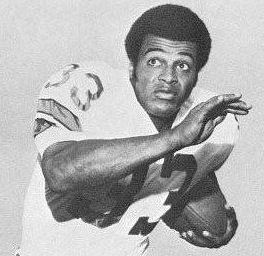 21 – Dallas Cowboys’ running back Duane Thomas was born on this day in 1947 in Dallas. Thomas had an exceptional career at Lincoln High School, then at West Texas State, where he teamed with another future pro running back, Mercury Morris. Thomas was the Cowboys’ first round pick (23rd overall) in the 1970 draft and was the NFC Rookie of the Year after leading Dallas in rushing (803 yards). He led the league in rushing in 1971 and led the Cowboys with 95 rushing yards and a touchdown in Dallas’ first Super Bowl victory, a 24-3 win over the Miami Dolphins in Super Bowl VI.
21 – Dallas Cowboys’ running back Duane Thomas was born on this day in 1947 in Dallas. Thomas had an exceptional career at Lincoln High School, then at West Texas State, where he teamed with another future pro running back, Mercury Morris. Thomas was the Cowboys’ first round pick (23rd overall) in the 1970 draft and was the NFC Rookie of the Year after leading Dallas in rushing (803 yards). He led the league in rushing in 1971 and led the Cowboys with 95 rushing yards and a touchdown in Dallas’ first Super Bowl victory, a 24-3 win over the Miami Dolphins in Super Bowl VI.
 21 – On this date in 1955, the El Paso School Board voted to abolish segregation in the city’s public schools becoming the first district in Texas to unconditionally favor desegregation. The move came one year after the U.S. Supreme Court struck down segregation in public schools in the Brown v. Board of Education decision. El Paso board member Ted Andress made the motion: “The School Board members have taken notice of the recent Supreme Court decision on compulsory segregation (which was enforced in Texas). I think it is time that this board makes the prompt and reasonable start toward integration that should be made. I move that we comply with all rulings of the Supreme Court and that segregation on a compulsory or involuntary basis shall not be enforced in the El Paso Public Schools.” The motion took effect with the opening of schools for the 1955 fall semester. (See TIPHC Bookshelf, “Desegregating Texas Schools”)
21 – On this date in 1955, the El Paso School Board voted to abolish segregation in the city’s public schools becoming the first district in Texas to unconditionally favor desegregation. The move came one year after the U.S. Supreme Court struck down segregation in public schools in the Brown v. Board of Education decision. El Paso board member Ted Andress made the motion: “The School Board members have taken notice of the recent Supreme Court decision on compulsory segregation (which was enforced in Texas). I think it is time that this board makes the prompt and reasonable start toward integration that should be made. I move that we comply with all rulings of the Supreme Court and that segregation on a compulsory or involuntary basis shall not be enforced in the El Paso Public Schools.” The motion took effect with the opening of schools for the 1955 fall semester. (See TIPHC Bookshelf, “Desegregating Texas Schools”)
 22 – On this date in 1962, basketball great Clyde “The Glide” Drexler was born in New Orleans. Drexler graduated from Sterling High School in Houston then attended the University of Houston where he starred as a member of the teams known as Phi Slama Jama for their fast pace, dunking, high flying style. Drexler was the 14th overall pick of the 1983 NBA Draft by the Portland Trail Blazers and twice led the team to the NBA Finals (1990, 1992). However, he played alongside center and former UH teammate Hakeem Olajuwon on the Houston Rockets 1995 NBA title team. Drexler was a 10-time All-Star, a member of the 1992 U.S. Olympic dream team, and named one of the 50 greatest players in NBA history. He was elected to Naismith Memorial Basketball Hall of Fame in 2004.
22 – On this date in 1962, basketball great Clyde “The Glide” Drexler was born in New Orleans. Drexler graduated from Sterling High School in Houston then attended the University of Houston where he starred as a member of the teams known as Phi Slama Jama for their fast pace, dunking, high flying style. Drexler was the 14th overall pick of the 1983 NBA Draft by the Portland Trail Blazers and twice led the team to the NBA Finals (1990, 1992). However, he played alongside center and former UH teammate Hakeem Olajuwon on the Houston Rockets 1995 NBA title team. Drexler was a 10-time All-Star, a member of the 1992 U.S. Olympic dream team, and named one of the 50 greatest players in NBA history. He was elected to Naismith Memorial Basketball Hall of Fame in 2004.
Blog: Ron Goodwin, Ph.D., author, PVAMU history professor
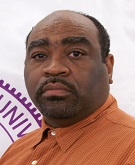 Ron Goodwin’s bi-weekly blog appears exclusively for TIPHC. Goodwin is a San Antonio native and Air Force veteran. Generally, his column addresses contemporary issues in the black community and how they relate to black history. He and the TIPHC staff welcome your comments.
Ron Goodwin’s bi-weekly blog appears exclusively for TIPHC. Goodwin is a San Antonio native and Air Force veteran. Generally, his column addresses contemporary issues in the black community and how they relate to black history. He and the TIPHC staff welcome your comments.
Read his latest entry, “Big People, Big Moments,” here.
Submissions Wanted
Historians, scholars, students, lend us your…writings. Help us produce the most comprehensive documentation ever undertaken for the African American experience in Texas. We encourage you to contribute items about people, places, events, issues, politics/legislation, sports, entertainment, religion, etc., as general entries or essays. Our documentation is wide-ranging and diverse, and you may research and write about the subject of your interest or, to start, please consult our list of suggested biographical entries and see submission guidelines. However, all topics must be approved by TIPHC editors before beginning your research/writing.
We welcome your questions or comments via email or telephone – mdhurd@pvamu.edu.
